Self-efficacy: Exploring its Impact on Sports and Life
VerifiedAdded on 2021/06/15
|11
|2791
|16
Report
AI Summary
This report delves into the concept of self-efficacy, a psychological construct that reflects an individual's belief in their ability to succeed in specific situations or accomplish a task. The report begins with an abstract defining self-efficacy, its importance, and its impact on learning and motivation. It then explores the significance of self-efficacy in various aspects of life, including education, professional, and personal domains. The report differentiates between efficacy and self-efficacy, highlighting the importance of a positive attitude in achieving success. The report then discusses factors that contribute to self-efficacy, such as past experiences, vicarious experiences, social persuasion, and emotional cues. It reviews the literature on self-efficacy, particularly in the context of sports, emphasizing how it boosts confidence, influences performance, and helps individuals cope with failures. The report concludes by summarizing the key findings and emphasizing the importance of self-efficacy for personal growth and achievement, also including a personal reflection on the author's experience with self-efficacy.

Running head: Self-efficacy
Self-efficacy
Self-efficacy
Paraphrase This Document
Need a fresh take? Get an instant paraphrase of this document with our AI Paraphraser

Self-efficacy 1
Abstract
Self-efficacy impacts the leaning of an individual by motivating them to link their capability
to achieve a task. In sports a players having high self-efficacy peruse for longer term and
encounter all the challenges by belief in their own self. In this report the detailed discussion is
done on the topic self-efficacy and its impact on one’s life. Self-efficacy is helpful in various
applications and strategies as it provides a way for goal mapping and avoiding the appearance
of unsolicited help from others.
Abstract
Self-efficacy impacts the leaning of an individual by motivating them to link their capability
to achieve a task. In sports a players having high self-efficacy peruse for longer term and
encounter all the challenges by belief in their own self. In this report the detailed discussion is
done on the topic self-efficacy and its impact on one’s life. Self-efficacy is helpful in various
applications and strategies as it provides a way for goal mapping and avoiding the appearance
of unsolicited help from others.

Self-efficacy 2
Table of Contents
Introduction...........................................................................................................................................3
Significance of Self-efficacy....................................................................................................................3
Difference between efficacy and Self-efficacy.......................................................................................3
Factors that contribute to self-efficacy..................................................................................................3
Literature Review..................................................................................................................................3
Conclusion.............................................................................................................................................3
References.............................................................................................................................................5
Table of Contents
Introduction...........................................................................................................................................3
Significance of Self-efficacy....................................................................................................................3
Difference between efficacy and Self-efficacy.......................................................................................3
Factors that contribute to self-efficacy..................................................................................................3
Literature Review..................................................................................................................................3
Conclusion.............................................................................................................................................3
References.............................................................................................................................................5
⊘ This is a preview!⊘
Do you want full access?
Subscribe today to unlock all pages.

Trusted by 1+ million students worldwide
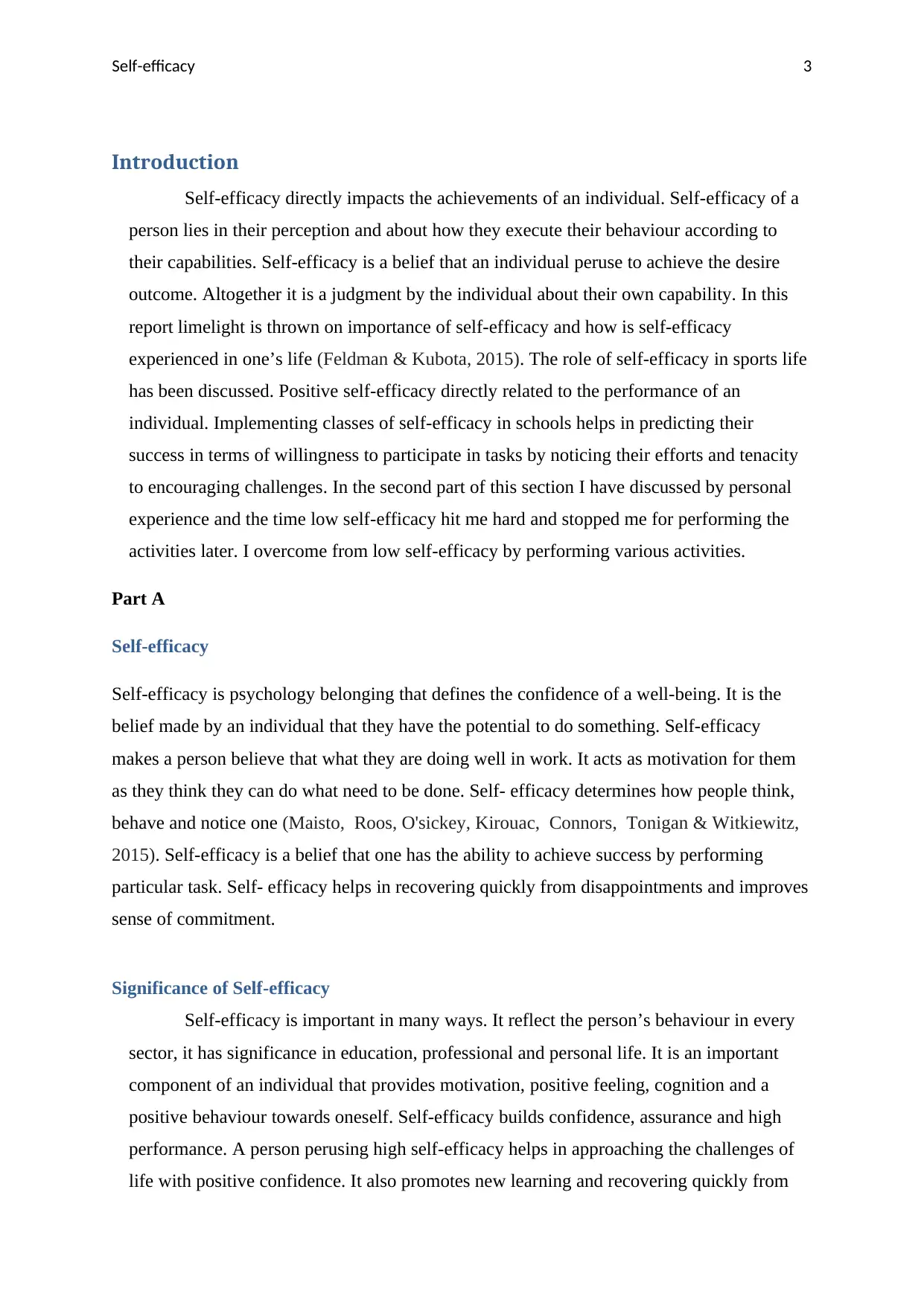
Self-efficacy 3
Introduction
Self-efficacy directly impacts the achievements of an individual. Self-efficacy of a
person lies in their perception and about how they execute their behaviour according to
their capabilities. Self-efficacy is a belief that an individual peruse to achieve the desire
outcome. Altogether it is a judgment by the individual about their own capability. In this
report limelight is thrown on importance of self-efficacy and how is self-efficacy
experienced in one’s life (Feldman & Kubota, 2015). The role of self-efficacy in sports life
has been discussed. Positive self-efficacy directly related to the performance of an
individual. Implementing classes of self-efficacy in schools helps in predicting their
success in terms of willingness to participate in tasks by noticing their efforts and tenacity
to encouraging challenges. In the second part of this section I have discussed by personal
experience and the time low self-efficacy hit me hard and stopped me for performing the
activities later. I overcome from low self-efficacy by performing various activities.
Part A
Self-efficacy
Self-efficacy is psychology belonging that defines the confidence of a well-being. It is the
belief made by an individual that they have the potential to do something. Self-efficacy
makes a person believe that what they are doing well in work. It acts as motivation for them
as they think they can do what need to be done. Self- efficacy determines how people think,
behave and notice one (Maisto, Roos, O'sickey, Kirouac, Connors, Tonigan & Witkiewitz,
2015). Self-efficacy is a belief that one has the ability to achieve success by performing
particular task. Self- efficacy helps in recovering quickly from disappointments and improves
sense of commitment.
Significance of Self-efficacy
Self-efficacy is important in many ways. It reflect the person’s behaviour in every
sector, it has significance in education, professional and personal life. It is an important
component of an individual that provides motivation, positive feeling, cognition and a
positive behaviour towards oneself. Self-efficacy builds confidence, assurance and high
performance. A person perusing high self-efficacy helps in approaching the challenges of
life with positive confidence. It also promotes new learning and recovering quickly from
Introduction
Self-efficacy directly impacts the achievements of an individual. Self-efficacy of a
person lies in their perception and about how they execute their behaviour according to
their capabilities. Self-efficacy is a belief that an individual peruse to achieve the desire
outcome. Altogether it is a judgment by the individual about their own capability. In this
report limelight is thrown on importance of self-efficacy and how is self-efficacy
experienced in one’s life (Feldman & Kubota, 2015). The role of self-efficacy in sports life
has been discussed. Positive self-efficacy directly related to the performance of an
individual. Implementing classes of self-efficacy in schools helps in predicting their
success in terms of willingness to participate in tasks by noticing their efforts and tenacity
to encouraging challenges. In the second part of this section I have discussed by personal
experience and the time low self-efficacy hit me hard and stopped me for performing the
activities later. I overcome from low self-efficacy by performing various activities.
Part A
Self-efficacy
Self-efficacy is psychology belonging that defines the confidence of a well-being. It is the
belief made by an individual that they have the potential to do something. Self-efficacy
makes a person believe that what they are doing well in work. It acts as motivation for them
as they think they can do what need to be done. Self- efficacy determines how people think,
behave and notice one (Maisto, Roos, O'sickey, Kirouac, Connors, Tonigan & Witkiewitz,
2015). Self-efficacy is a belief that one has the ability to achieve success by performing
particular task. Self- efficacy helps in recovering quickly from disappointments and improves
sense of commitment.
Significance of Self-efficacy
Self-efficacy is important in many ways. It reflect the person’s behaviour in every
sector, it has significance in education, professional and personal life. It is an important
component of an individual that provides motivation, positive feeling, cognition and a
positive behaviour towards oneself. Self-efficacy builds confidence, assurance and high
performance. A person perusing high self-efficacy helps in approaching the challenges of
life with positive confidence. It also promotes new learning and recovering quickly from
Paraphrase This Document
Need a fresh take? Get an instant paraphrase of this document with our AI Paraphraser
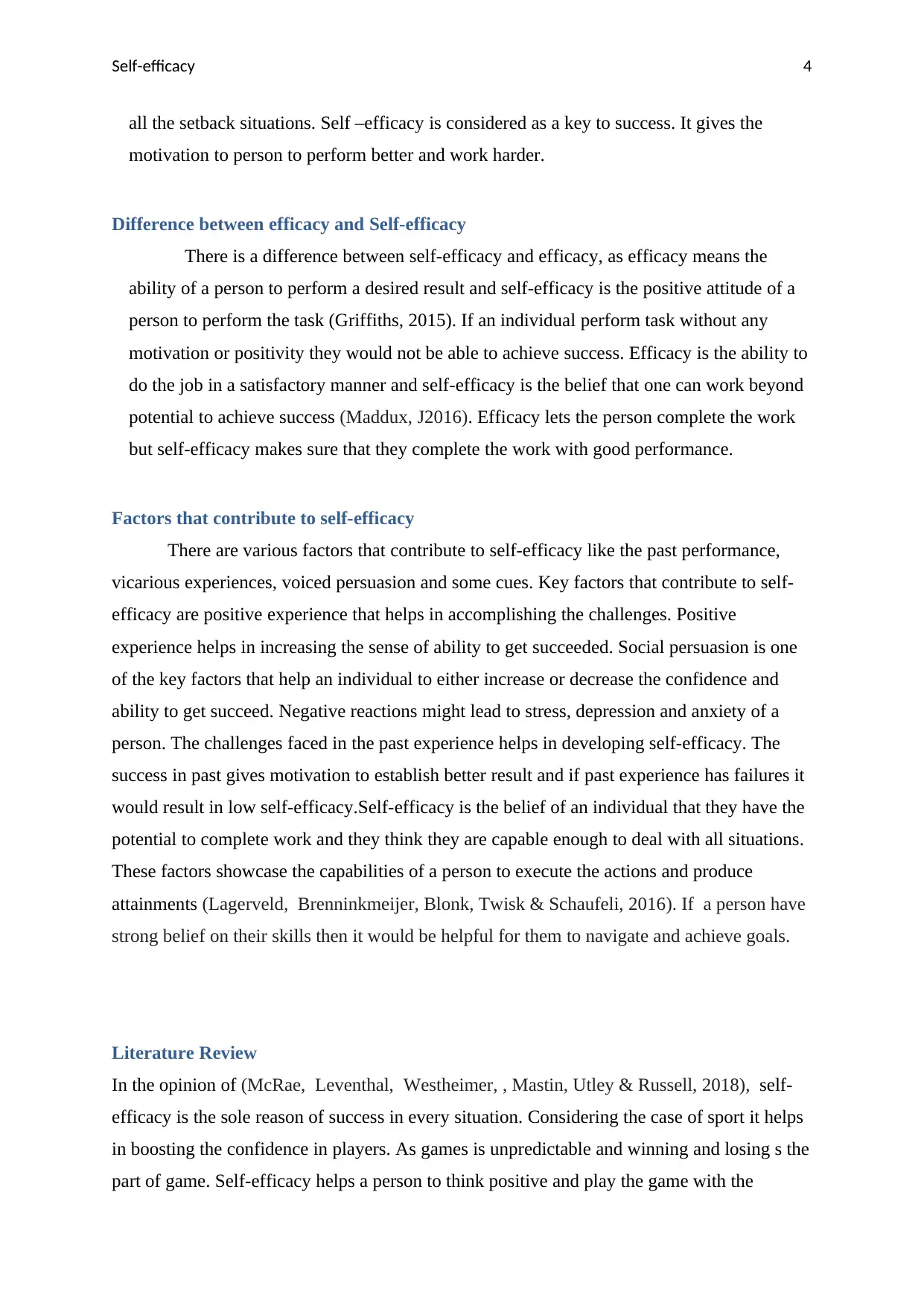
Self-efficacy 4
all the setback situations. Self –efficacy is considered as a key to success. It gives the
motivation to person to perform better and work harder.
Difference between efficacy and Self-efficacy
There is a difference between self-efficacy and efficacy, as efficacy means the
ability of a person to perform a desired result and self-efficacy is the positive attitude of a
person to perform the task (Griffiths, 2015). If an individual perform task without any
motivation or positivity they would not be able to achieve success. Efficacy is the ability to
do the job in a satisfactory manner and self-efficacy is the belief that one can work beyond
potential to achieve success (Maddux, J2016). Efficacy lets the person complete the work
but self-efficacy makes sure that they complete the work with good performance.
Factors that contribute to self-efficacy
There are various factors that contribute to self-efficacy like the past performance,
vicarious experiences, voiced persuasion and some cues. Key factors that contribute to self-
efficacy are positive experience that helps in accomplishing the challenges. Positive
experience helps in increasing the sense of ability to get succeeded. Social persuasion is one
of the key factors that help an individual to either increase or decrease the confidence and
ability to get succeed. Negative reactions might lead to stress, depression and anxiety of a
person. The challenges faced in the past experience helps in developing self-efficacy. The
success in past gives motivation to establish better result and if past experience has failures it
would result in low self-efficacy.Self-efficacy is the belief of an individual that they have the
potential to complete work and they think they are capable enough to deal with all situations.
These factors showcase the capabilities of a person to execute the actions and produce
attainments (Lagerveld, Brenninkmeijer, Blonk, Twisk & Schaufeli, 2016). If a person have
strong belief on their skills then it would be helpful for them to navigate and achieve goals.
Literature Review
In the opinion of (McRae, Leventhal, Westheimer, , Mastin, Utley & Russell, 2018), self-
efficacy is the sole reason of success in every situation. Considering the case of sport it helps
in boosting the confidence in players. As games is unpredictable and winning and losing s the
part of game. Self-efficacy helps a person to think positive and play the game with the
all the setback situations. Self –efficacy is considered as a key to success. It gives the
motivation to person to perform better and work harder.
Difference between efficacy and Self-efficacy
There is a difference between self-efficacy and efficacy, as efficacy means the
ability of a person to perform a desired result and self-efficacy is the positive attitude of a
person to perform the task (Griffiths, 2015). If an individual perform task without any
motivation or positivity they would not be able to achieve success. Efficacy is the ability to
do the job in a satisfactory manner and self-efficacy is the belief that one can work beyond
potential to achieve success (Maddux, J2016). Efficacy lets the person complete the work
but self-efficacy makes sure that they complete the work with good performance.
Factors that contribute to self-efficacy
There are various factors that contribute to self-efficacy like the past performance,
vicarious experiences, voiced persuasion and some cues. Key factors that contribute to self-
efficacy are positive experience that helps in accomplishing the challenges. Positive
experience helps in increasing the sense of ability to get succeeded. Social persuasion is one
of the key factors that help an individual to either increase or decrease the confidence and
ability to get succeed. Negative reactions might lead to stress, depression and anxiety of a
person. The challenges faced in the past experience helps in developing self-efficacy. The
success in past gives motivation to establish better result and if past experience has failures it
would result in low self-efficacy.Self-efficacy is the belief of an individual that they have the
potential to complete work and they think they are capable enough to deal with all situations.
These factors showcase the capabilities of a person to execute the actions and produce
attainments (Lagerveld, Brenninkmeijer, Blonk, Twisk & Schaufeli, 2016). If a person have
strong belief on their skills then it would be helpful for them to navigate and achieve goals.
Literature Review
In the opinion of (McRae, Leventhal, Westheimer, , Mastin, Utley & Russell, 2018), self-
efficacy is the sole reason of success in every situation. Considering the case of sport it helps
in boosting the confidence in players. As games is unpredictable and winning and losing s the
part of game. Self-efficacy helps a person to think positive and play the game with the
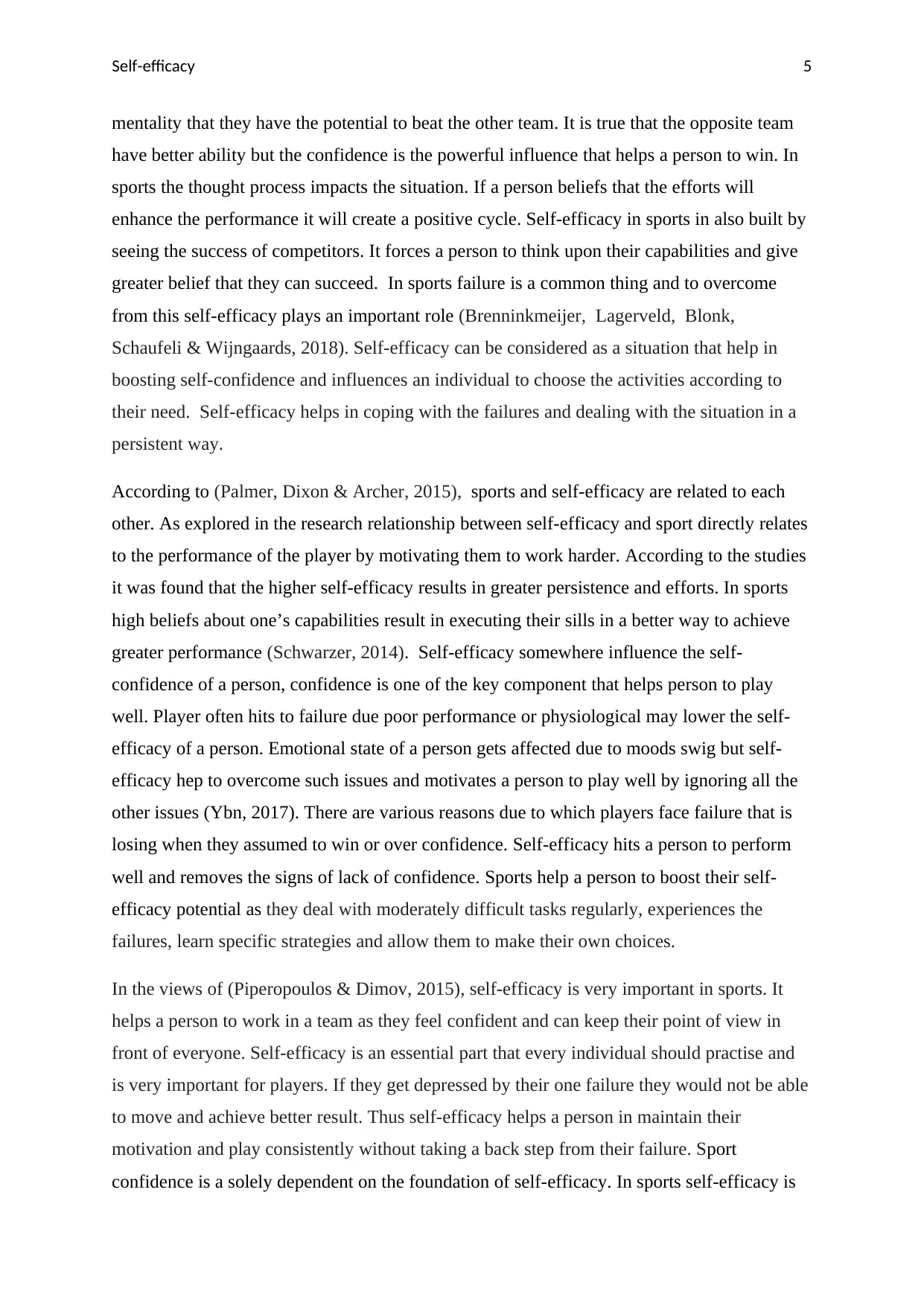
Self-efficacy 5
mentality that they have the potential to beat the other team. It is true that the opposite team
have better ability but the confidence is the powerful influence that helps a person to win. In
sports the thought process impacts the situation. If a person beliefs that the efforts will
enhance the performance it will create a positive cycle. Self-efficacy in sports in also built by
seeing the success of competitors. It forces a person to think upon their capabilities and give
greater belief that they can succeed. In sports failure is a common thing and to overcome
from this self-efficacy plays an important role (Brenninkmeijer, Lagerveld, Blonk,
Schaufeli & Wijngaards, 2018). Self-efficacy can be considered as a situation that help in
boosting self-confidence and influences an individual to choose the activities according to
their need. Self-efficacy helps in coping with the failures and dealing with the situation in a
persistent way.
According to (Palmer, Dixon & Archer, 2015), sports and self-efficacy are related to each
other. As explored in the research relationship between self-efficacy and sport directly relates
to the performance of the player by motivating them to work harder. According to the studies
it was found that the higher self-efficacy results in greater persistence and efforts. In sports
high beliefs about one’s capabilities result in executing their sills in a better way to achieve
greater performance (Schwarzer, 2014). Self-efficacy somewhere influence the self-
confidence of a person, confidence is one of the key component that helps person to play
well. Player often hits to failure due poor performance or physiological may lower the self-
efficacy of a person. Emotional state of a person gets affected due to moods swig but self-
efficacy hep to overcome such issues and motivates a person to play well by ignoring all the
other issues (Ybn, 2017). There are various reasons due to which players face failure that is
losing when they assumed to win or over confidence. Self-efficacy hits a person to perform
well and removes the signs of lack of confidence. Sports help a person to boost their self-
efficacy potential as they deal with moderately difficult tasks regularly, experiences the
failures, learn specific strategies and allow them to make their own choices.
In the views of (Piperopoulos & Dimov, 2015), self-efficacy is very important in sports. It
helps a person to work in a team as they feel confident and can keep their point of view in
front of everyone. Self-efficacy is an essential part that every individual should practise and
is very important for players. If they get depressed by their one failure they would not be able
to move and achieve better result. Thus self-efficacy helps a person in maintain their
motivation and play consistently without taking a back step from their failure. Sport
confidence is a solely dependent on the foundation of self-efficacy. In sports self-efficacy is
mentality that they have the potential to beat the other team. It is true that the opposite team
have better ability but the confidence is the powerful influence that helps a person to win. In
sports the thought process impacts the situation. If a person beliefs that the efforts will
enhance the performance it will create a positive cycle. Self-efficacy in sports in also built by
seeing the success of competitors. It forces a person to think upon their capabilities and give
greater belief that they can succeed. In sports failure is a common thing and to overcome
from this self-efficacy plays an important role (Brenninkmeijer, Lagerveld, Blonk,
Schaufeli & Wijngaards, 2018). Self-efficacy can be considered as a situation that help in
boosting self-confidence and influences an individual to choose the activities according to
their need. Self-efficacy helps in coping with the failures and dealing with the situation in a
persistent way.
According to (Palmer, Dixon & Archer, 2015), sports and self-efficacy are related to each
other. As explored in the research relationship between self-efficacy and sport directly relates
to the performance of the player by motivating them to work harder. According to the studies
it was found that the higher self-efficacy results in greater persistence and efforts. In sports
high beliefs about one’s capabilities result in executing their sills in a better way to achieve
greater performance (Schwarzer, 2014). Self-efficacy somewhere influence the self-
confidence of a person, confidence is one of the key component that helps person to play
well. Player often hits to failure due poor performance or physiological may lower the self-
efficacy of a person. Emotional state of a person gets affected due to moods swig but self-
efficacy hep to overcome such issues and motivates a person to play well by ignoring all the
other issues (Ybn, 2017). There are various reasons due to which players face failure that is
losing when they assumed to win or over confidence. Self-efficacy hits a person to perform
well and removes the signs of lack of confidence. Sports help a person to boost their self-
efficacy potential as they deal with moderately difficult tasks regularly, experiences the
failures, learn specific strategies and allow them to make their own choices.
In the views of (Piperopoulos & Dimov, 2015), self-efficacy is very important in sports. It
helps a person to work in a team as they feel confident and can keep their point of view in
front of everyone. Self-efficacy is an essential part that every individual should practise and
is very important for players. If they get depressed by their one failure they would not be able
to move and achieve better result. Thus self-efficacy helps a person in maintain their
motivation and play consistently without taking a back step from their failure. Sport
confidence is a solely dependent on the foundation of self-efficacy. In sports self-efficacy is
⊘ This is a preview!⊘
Do you want full access?
Subscribe today to unlock all pages.

Trusted by 1+ million students worldwide
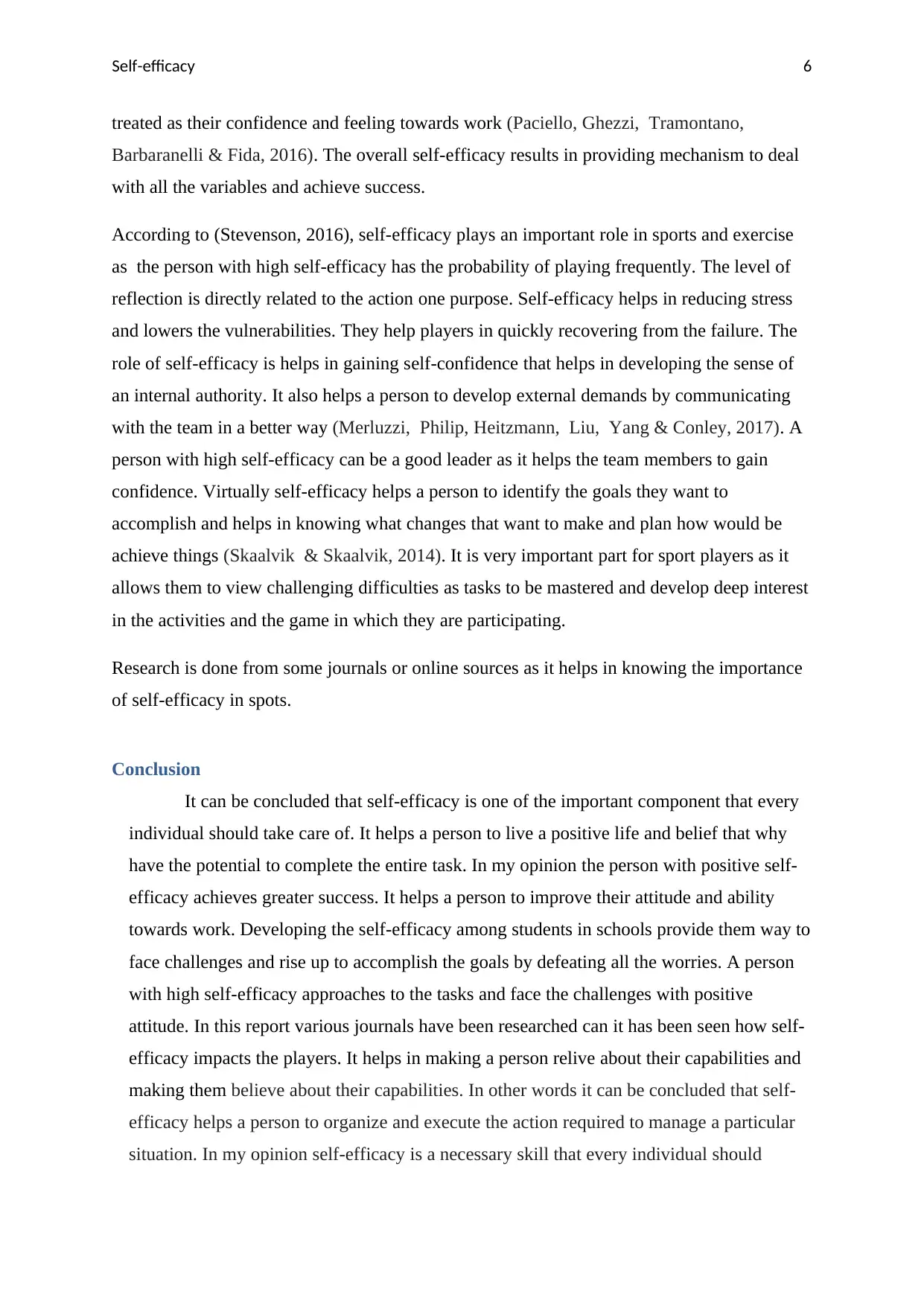
Self-efficacy 6
treated as their confidence and feeling towards work (Paciello, Ghezzi, Tramontano,
Barbaranelli & Fida, 2016). The overall self-efficacy results in providing mechanism to deal
with all the variables and achieve success.
According to (Stevenson, 2016), self-efficacy plays an important role in sports and exercise
as the person with high self-efficacy has the probability of playing frequently. The level of
reflection is directly related to the action one purpose. Self-efficacy helps in reducing stress
and lowers the vulnerabilities. They help players in quickly recovering from the failure. The
role of self-efficacy is helps in gaining self-confidence that helps in developing the sense of
an internal authority. It also helps a person to develop external demands by communicating
with the team in a better way (Merluzzi, Philip, Heitzmann, Liu, Yang & Conley, 2017). A
person with high self-efficacy can be a good leader as it helps the team members to gain
confidence. Virtually self-efficacy helps a person to identify the goals they want to
accomplish and helps in knowing what changes that want to make and plan how would be
achieve things (Skaalvik & Skaalvik, 2014). It is very important part for sport players as it
allows them to view challenging difficulties as tasks to be mastered and develop deep interest
in the activities and the game in which they are participating.
Research is done from some journals or online sources as it helps in knowing the importance
of self-efficacy in spots.
Conclusion
It can be concluded that self-efficacy is one of the important component that every
individual should take care of. It helps a person to live a positive life and belief that why
have the potential to complete the entire task. In my opinion the person with positive self-
efficacy achieves greater success. It helps a person to improve their attitude and ability
towards work. Developing the self-efficacy among students in schools provide them way to
face challenges and rise up to accomplish the goals by defeating all the worries. A person
with high self-efficacy approaches to the tasks and face the challenges with positive
attitude. In this report various journals have been researched can it has been seen how self-
efficacy impacts the players. It helps in making a person relive about their capabilities and
making them believe about their capabilities. In other words it can be concluded that self-
efficacy helps a person to organize and execute the action required to manage a particular
situation. In my opinion self-efficacy is a necessary skill that every individual should
treated as their confidence and feeling towards work (Paciello, Ghezzi, Tramontano,
Barbaranelli & Fida, 2016). The overall self-efficacy results in providing mechanism to deal
with all the variables and achieve success.
According to (Stevenson, 2016), self-efficacy plays an important role in sports and exercise
as the person with high self-efficacy has the probability of playing frequently. The level of
reflection is directly related to the action one purpose. Self-efficacy helps in reducing stress
and lowers the vulnerabilities. They help players in quickly recovering from the failure. The
role of self-efficacy is helps in gaining self-confidence that helps in developing the sense of
an internal authority. It also helps a person to develop external demands by communicating
with the team in a better way (Merluzzi, Philip, Heitzmann, Liu, Yang & Conley, 2017). A
person with high self-efficacy can be a good leader as it helps the team members to gain
confidence. Virtually self-efficacy helps a person to identify the goals they want to
accomplish and helps in knowing what changes that want to make and plan how would be
achieve things (Skaalvik & Skaalvik, 2014). It is very important part for sport players as it
allows them to view challenging difficulties as tasks to be mastered and develop deep interest
in the activities and the game in which they are participating.
Research is done from some journals or online sources as it helps in knowing the importance
of self-efficacy in spots.
Conclusion
It can be concluded that self-efficacy is one of the important component that every
individual should take care of. It helps a person to live a positive life and belief that why
have the potential to complete the entire task. In my opinion the person with positive self-
efficacy achieves greater success. It helps a person to improve their attitude and ability
towards work. Developing the self-efficacy among students in schools provide them way to
face challenges and rise up to accomplish the goals by defeating all the worries. A person
with high self-efficacy approaches to the tasks and face the challenges with positive
attitude. In this report various journals have been researched can it has been seen how self-
efficacy impacts the players. It helps in making a person relive about their capabilities and
making them believe about their capabilities. In other words it can be concluded that self-
efficacy helps a person to organize and execute the action required to manage a particular
situation. In my opinion self-efficacy is a necessary skill that every individual should
Paraphrase This Document
Need a fresh take? Get an instant paraphrase of this document with our AI Paraphraser

Self-efficacy 7
peruse as it supports them to take risk. It helps a person to believe on their own destiny
which in turn motivates them to enhance their skills.
peruse as it supports them to take risk. It helps a person to believe on their own destiny
which in turn motivates them to enhance their skills.
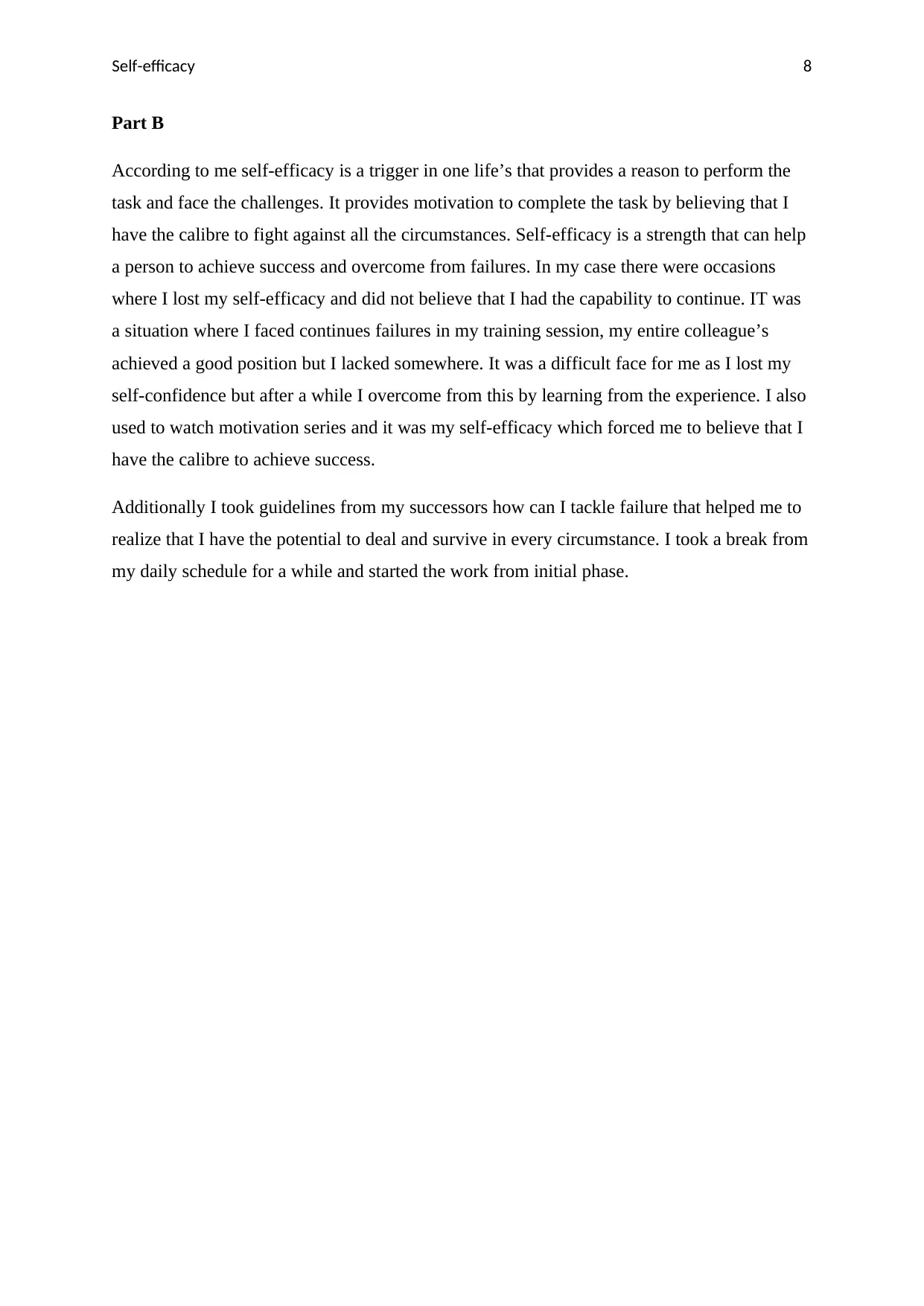
Self-efficacy 8
Part B
According to me self-efficacy is a trigger in one life’s that provides a reason to perform the
task and face the challenges. It provides motivation to complete the task by believing that I
have the calibre to fight against all the circumstances. Self-efficacy is a strength that can help
a person to achieve success and overcome from failures. In my case there were occasions
where I lost my self-efficacy and did not believe that I had the capability to continue. IT was
a situation where I faced continues failures in my training session, my entire colleague’s
achieved a good position but I lacked somewhere. It was a difficult face for me as I lost my
self-confidence but after a while I overcome from this by learning from the experience. I also
used to watch motivation series and it was my self-efficacy which forced me to believe that I
have the calibre to achieve success.
Additionally I took guidelines from my successors how can I tackle failure that helped me to
realize that I have the potential to deal and survive in every circumstance. I took a break from
my daily schedule for a while and started the work from initial phase.
Part B
According to me self-efficacy is a trigger in one life’s that provides a reason to perform the
task and face the challenges. It provides motivation to complete the task by believing that I
have the calibre to fight against all the circumstances. Self-efficacy is a strength that can help
a person to achieve success and overcome from failures. In my case there were occasions
where I lost my self-efficacy and did not believe that I had the capability to continue. IT was
a situation where I faced continues failures in my training session, my entire colleague’s
achieved a good position but I lacked somewhere. It was a difficult face for me as I lost my
self-confidence but after a while I overcome from this by learning from the experience. I also
used to watch motivation series and it was my self-efficacy which forced me to believe that I
have the calibre to achieve success.
Additionally I took guidelines from my successors how can I tackle failure that helped me to
realize that I have the potential to deal and survive in every circumstance. I took a break from
my daily schedule for a while and started the work from initial phase.
⊘ This is a preview!⊘
Do you want full access?
Subscribe today to unlock all pages.

Trusted by 1+ million students worldwide
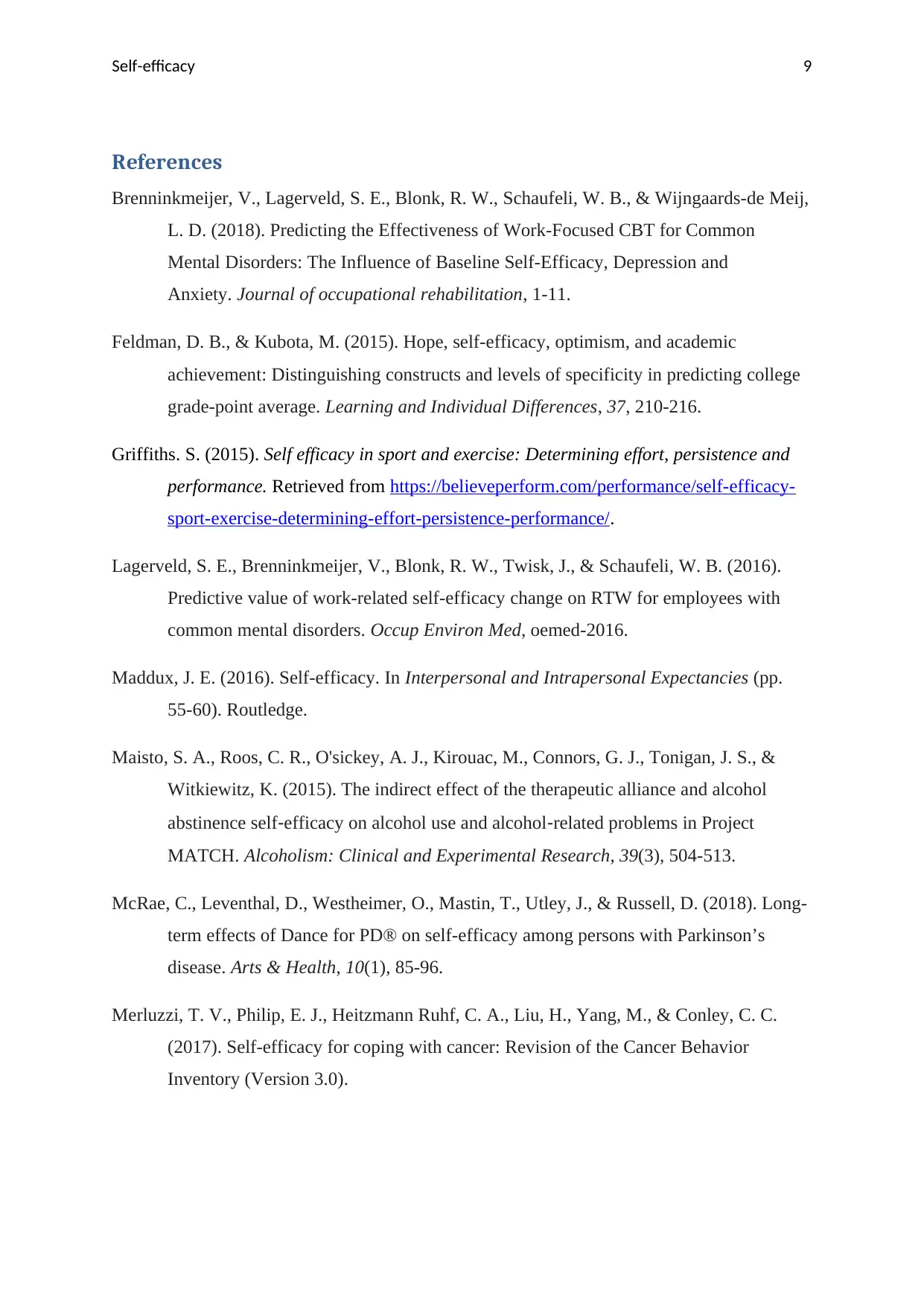
Self-efficacy 9
References
Brenninkmeijer, V., Lagerveld, S. E., Blonk, R. W., Schaufeli, W. B., & Wijngaards-de Meij,
L. D. (2018). Predicting the Effectiveness of Work-Focused CBT for Common
Mental Disorders: The Influence of Baseline Self-Efficacy, Depression and
Anxiety. Journal of occupational rehabilitation, 1-11.
Feldman, D. B., & Kubota, M. (2015). Hope, self-efficacy, optimism, and academic
achievement: Distinguishing constructs and levels of specificity in predicting college
grade-point average. Learning and Individual Differences, 37, 210-216.
Griffiths. S. (2015). Self efficacy in sport and exercise: Determining effort, persistence and
performance. Retrieved from https://believeperform.com/performance/self-efficacy-
sport-exercise-determining-effort-persistence-performance/.
Lagerveld, S. E., Brenninkmeijer, V., Blonk, R. W., Twisk, J., & Schaufeli, W. B. (2016).
Predictive value of work-related self-efficacy change on RTW for employees with
common mental disorders. Occup Environ Med, oemed-2016.
Maddux, J. E. (2016). Self-efficacy. In Interpersonal and Intrapersonal Expectancies (pp.
55-60). Routledge.
Maisto, S. A., Roos, C. R., O'sickey, A. J., Kirouac, M., Connors, G. J., Tonigan, J. S., &
Witkiewitz, K. (2015). The indirect effect of the therapeutic alliance and alcohol
abstinence self‐efficacy on alcohol use and alcohol‐related problems in Project
MATCH. Alcoholism: Clinical and Experimental Research, 39(3), 504-513.
McRae, C., Leventhal, D., Westheimer, O., Mastin, T., Utley, J., & Russell, D. (2018). Long-
term effects of Dance for PD® on self-efficacy among persons with Parkinson’s
disease. Arts & Health, 10(1), 85-96.
Merluzzi, T. V., Philip, E. J., Heitzmann Ruhf, C. A., Liu, H., Yang, M., & Conley, C. C.
(2017). Self-efficacy for coping with cancer: Revision of the Cancer Behavior
Inventory (Version 3.0).
References
Brenninkmeijer, V., Lagerveld, S. E., Blonk, R. W., Schaufeli, W. B., & Wijngaards-de Meij,
L. D. (2018). Predicting the Effectiveness of Work-Focused CBT for Common
Mental Disorders: The Influence of Baseline Self-Efficacy, Depression and
Anxiety. Journal of occupational rehabilitation, 1-11.
Feldman, D. B., & Kubota, M. (2015). Hope, self-efficacy, optimism, and academic
achievement: Distinguishing constructs and levels of specificity in predicting college
grade-point average. Learning and Individual Differences, 37, 210-216.
Griffiths. S. (2015). Self efficacy in sport and exercise: Determining effort, persistence and
performance. Retrieved from https://believeperform.com/performance/self-efficacy-
sport-exercise-determining-effort-persistence-performance/.
Lagerveld, S. E., Brenninkmeijer, V., Blonk, R. W., Twisk, J., & Schaufeli, W. B. (2016).
Predictive value of work-related self-efficacy change on RTW for employees with
common mental disorders. Occup Environ Med, oemed-2016.
Maddux, J. E. (2016). Self-efficacy. In Interpersonal and Intrapersonal Expectancies (pp.
55-60). Routledge.
Maisto, S. A., Roos, C. R., O'sickey, A. J., Kirouac, M., Connors, G. J., Tonigan, J. S., &
Witkiewitz, K. (2015). The indirect effect of the therapeutic alliance and alcohol
abstinence self‐efficacy on alcohol use and alcohol‐related problems in Project
MATCH. Alcoholism: Clinical and Experimental Research, 39(3), 504-513.
McRae, C., Leventhal, D., Westheimer, O., Mastin, T., Utley, J., & Russell, D. (2018). Long-
term effects of Dance for PD® on self-efficacy among persons with Parkinson’s
disease. Arts & Health, 10(1), 85-96.
Merluzzi, T. V., Philip, E. J., Heitzmann Ruhf, C. A., Liu, H., Yang, M., & Conley, C. C.
(2017). Self-efficacy for coping with cancer: Revision of the Cancer Behavior
Inventory (Version 3.0).
Paraphrase This Document
Need a fresh take? Get an instant paraphrase of this document with our AI Paraphraser
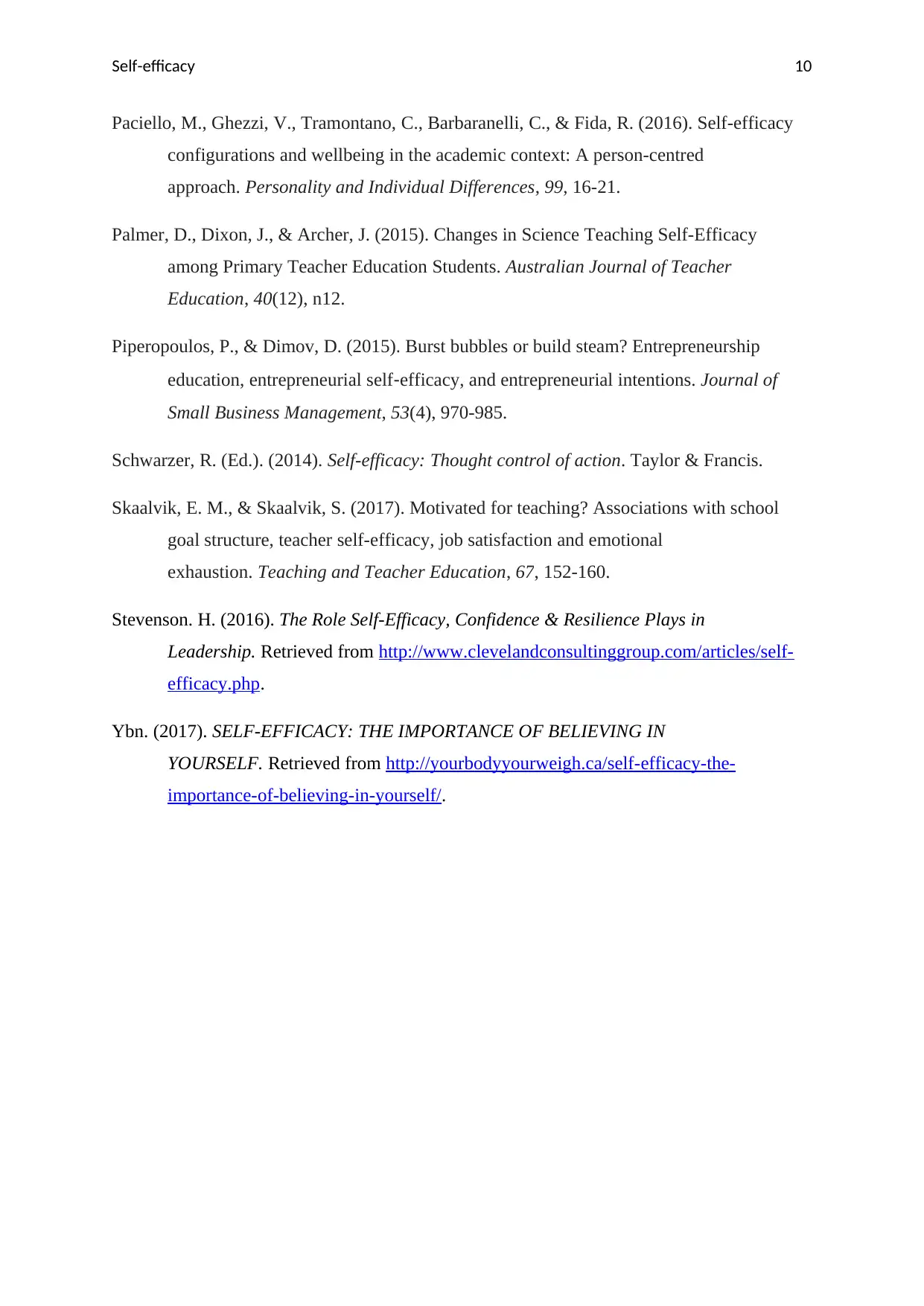
Self-efficacy 10
Paciello, M., Ghezzi, V., Tramontano, C., Barbaranelli, C., & Fida, R. (2016). Self-efficacy
configurations and wellbeing in the academic context: A person-centred
approach. Personality and Individual Differences, 99, 16-21.
Palmer, D., Dixon, J., & Archer, J. (2015). Changes in Science Teaching Self-Efficacy
among Primary Teacher Education Students. Australian Journal of Teacher
Education, 40(12), n12.
Piperopoulos, P., & Dimov, D. (2015). Burst bubbles or build steam? Entrepreneurship
education, entrepreneurial self‐efficacy, and entrepreneurial intentions. Journal of
Small Business Management, 53(4), 970-985.
Schwarzer, R. (Ed.). (2014). Self-efficacy: Thought control of action. Taylor & Francis.
Skaalvik, E. M., & Skaalvik, S. (2017). Motivated for teaching? Associations with school
goal structure, teacher self-efficacy, job satisfaction and emotional
exhaustion. Teaching and Teacher Education, 67, 152-160.
Stevenson. H. (2016). The Role Self-Efficacy, Confidence & Resilience Plays in
Leadership. Retrieved from http://www.clevelandconsultinggroup.com/articles/self-
efficacy.php.
Ybn. (2017). SELF-EFFICACY: THE IMPORTANCE OF BELIEVING IN
YOURSELF. Retrieved from http://yourbodyyourweigh.ca/self-efficacy-the-
importance-of-believing-in-yourself/.
Paciello, M., Ghezzi, V., Tramontano, C., Barbaranelli, C., & Fida, R. (2016). Self-efficacy
configurations and wellbeing in the academic context: A person-centred
approach. Personality and Individual Differences, 99, 16-21.
Palmer, D., Dixon, J., & Archer, J. (2015). Changes in Science Teaching Self-Efficacy
among Primary Teacher Education Students. Australian Journal of Teacher
Education, 40(12), n12.
Piperopoulos, P., & Dimov, D. (2015). Burst bubbles or build steam? Entrepreneurship
education, entrepreneurial self‐efficacy, and entrepreneurial intentions. Journal of
Small Business Management, 53(4), 970-985.
Schwarzer, R. (Ed.). (2014). Self-efficacy: Thought control of action. Taylor & Francis.
Skaalvik, E. M., & Skaalvik, S. (2017). Motivated for teaching? Associations with school
goal structure, teacher self-efficacy, job satisfaction and emotional
exhaustion. Teaching and Teacher Education, 67, 152-160.
Stevenson. H. (2016). The Role Self-Efficacy, Confidence & Resilience Plays in
Leadership. Retrieved from http://www.clevelandconsultinggroup.com/articles/self-
efficacy.php.
Ybn. (2017). SELF-EFFICACY: THE IMPORTANCE OF BELIEVING IN
YOURSELF. Retrieved from http://yourbodyyourweigh.ca/self-efficacy-the-
importance-of-believing-in-yourself/.
1 out of 11
Related Documents
Your All-in-One AI-Powered Toolkit for Academic Success.
+13062052269
info@desklib.com
Available 24*7 on WhatsApp / Email
![[object Object]](/_next/static/media/star-bottom.7253800d.svg)
Unlock your academic potential
Copyright © 2020–2026 A2Z Services. All Rights Reserved. Developed and managed by ZUCOL.





